What Do Deer Eat?
» Deer stories » Do deer eat » What Do Deer Eat?These herbivores have a diverse diet, and their eating habits depend on the season, their geographical location, and the availability of food. In this article, we will explore what deer eat, their favorite treats, and what they eat in the wild.
As deer farmers, we can answer your questions on what food is safe to feed to the deer.
What Do Deer Normally Eat?
Generally, when it comes to what plants do deer eat in the wild, deer are pretty much down for plant-based anything. And by "anything," I mean anything - just ask any gardener who's had their carefully cultivated plants reduced to nubs by these voracious herbivores. If you're a gardener, you know the struggle is real. Those 🦌🦌 are more than happy to nibble on your prize-winning roses, your fresh veggies, and pretty much anything else you've got growing. It's like they're thinking, "Oh, what's that? Looks tasty. nibble nibble Oh, and that too? nibble nibble Don't mind if I do."
Here are some of the main categories of food that deer normally eat:
- Leaves and shoots: Deer browse on the leaves and shoots of trees and shrubs, including maple, oak, willow, and dogwood.
- Grasses: Deer feed on a variety of grasses, including tall prairie grasses, bluegrass, and fescue.
- Twigs and branches: In the winter, when other food sources are scarce, deer will strip the bark from twigs and small branches to access the inner layer of the tree.
- Nuts and acorns: Deer love to eat nuts and acorns, including those from oak, hickory, and beech trees.
- Fruits and berries: Apples, pears, blackberries, and blueberries are just a few of the fruits and berries that deer enjoy.
- Legumes: Deer will graze on legumes such as clover, alfalfa, and soybeans.
- Forbs and wildflowers: Forbs are non-woody plants that are typically found in open fields or meadows. Deer will eat a variety of forbs and wildflowers, including dandelions, goldenrod, and asters.
Overall, deer are opportunistic eaters and will consume whatever plant-based foods are available to them depending on the season and their geographical location. A muntjac deer, for example, can eat up to 85 different types of plants [source].
According to Mississippi State University, white-tailed deer's salivary glands produce enzymes that help deactivate secondary plant compounds, (tannins), that disrupt digestion. These enzymes allow them to eat a quantity of acorns that would kill a cow.
What Do Deer Eat in The Summer?
In the summer, deer have a diverse range of food options available to them.
They typically feed on plants including clover, wildflowers, corn, soybeans, rye, alfalfa, berries, legumes and a whole bunch more. But you know what else they like to munch on? Apples, crab apples, plum bushes, and even some shrooms. Basically, if it's within reach, they'll probably give it a taste.
What Do Deer Eat in Winter?
Food is significantly harder to find in winter, so deer become reliant on buds, saplings, woody plants, including evergreens, bark and dried leaves.
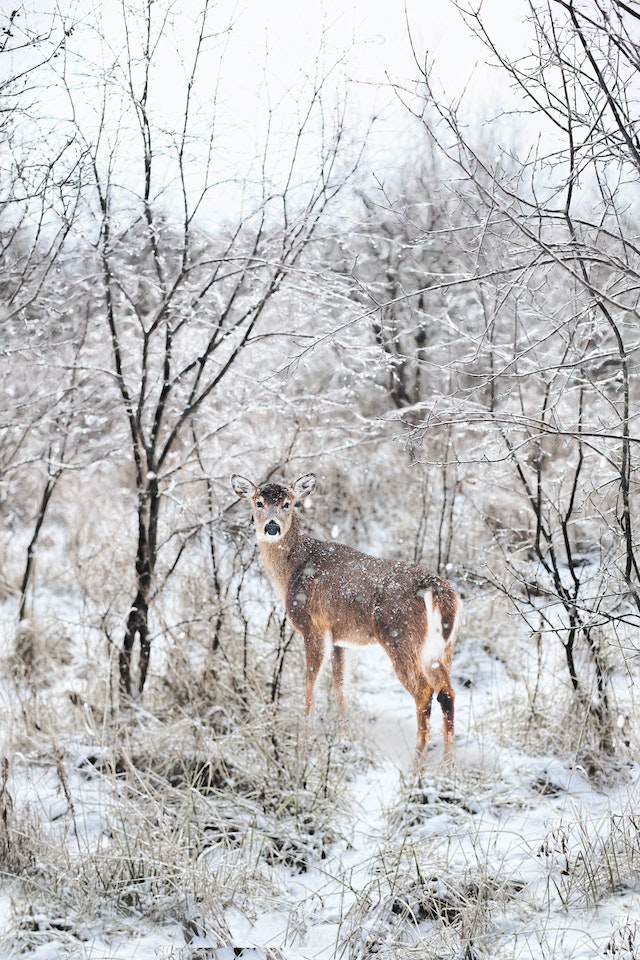
Photo by Jill Wellington
That's not much and wild deer do lose weight in winter, up to 30% of their body mass, that's why they try to gain as much as possible in warmer months.
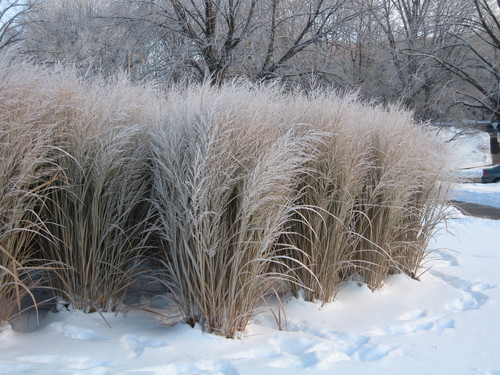
One of the winter food sources for deer is Panicum virgatum. Photo: https://rockspringdesign.wordpress.com
If the herd is lucky to be in the area where unsuspecting farmers have planted their crops, they will also invite themselves to feast on agricultural crops like wheat, rye, or soybeans.
According to the Department of Environmental Conservation, based on thousands of observations from deer wintering areas in New York State, winter deer food favorites are:
- cedar (white or arborvitae)
- sassafras, wintergreen
- alternate-leaved dogwood
- yew
- mountain maple
- witch hobble
- basswood
- apple
- maples
- flowering dogwood
- staghorn sumac.
What Do Deer Like To Eat The Most?
One question if what deer can eat and another - what they prefer if they have a choice. What treats do deer like to eat?
Deer love to eat berries, acorns, nuts, corn, fruits like bananas, peaches and pears, carrots and bread. A lot of their favorite picks you'll find in the list below. All such yummies come with a warning though, while feeding tree branches or oats is totaly safe, basically anything deer wouldn't normally find in the woods - isn't safe in big quantities. Please see considerations about feeding deer.
Do Deer Eat Meat, Small Animals?
Deer are mainly all about that veggie life, but every once in a while they go rogue and get a little meaty. I mean, we're talking super rare occasions here, usually when they're feeling pretty desperate for a snack. It's been known to happen that a deer might chow down on a bird, rodent, or even a fish - but that's not exactly their go-to meal. I guess you could say they're not really big fans of the whole "meat and greet" thing. We have a post dedicated to this question titled Are Deer Herbivores, Omnivores or Carnivores.
Does Deer Diet Vary Between Species?
Yes, there is a noticeable difference in the diets of, for example, White-tailed deer, Fallow deer, and Mule deer.
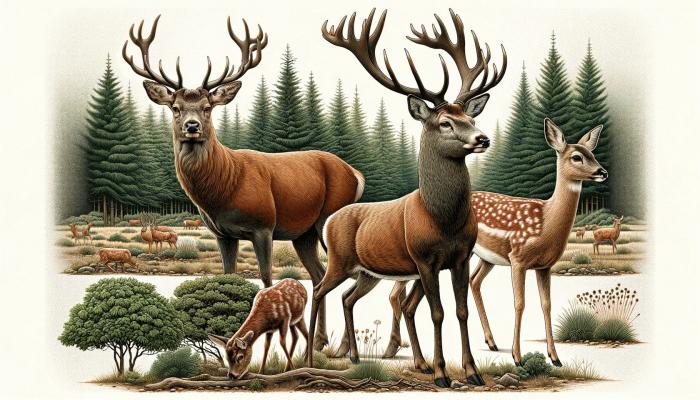
White-tailed deer, Roe deer and Red deer: AI generated illustration
The diets of White-tailed deer, Fallow deer, and Mule deer overlap significantly, as all are herbivores consuming a variety of plant materials. The key differences arise from their preferred habitats and the resulting availability of food sources. White-tailed deer have the most varied diet due to their adaptability to different environments, including agricultural landscapes. Fallow deer, while also versatile, tend to consume more mast (acorns and beech mast) and less agricultural produce. Mule deer, adapted to more arid and mountainous regions, rely heavily on browse from shrubs and trees, with less emphasis on grasses compared to the other two species.
This comparison is based on general knowledge but specific dietary habits can vary widely within each species due to local habitat conditions, seasonal changes, and food availability.
Should You Feed Wild Deer?
If you've landed here searching for «what do deer like to eat», you're likely thinking of feeding deer in your backyard. In that case, keep in mind that depending on where you live it may be illegal for you to do that.
Winter is a challenging time for deer, and a nature's way of culling the weaker herd members. (( As heartbreaking as that may be, supplemental feeding of them presents its own set of problems and according to many reputable sources can do more harm than good. Such as:
- introducing improper food. Corn, bread will be eaten by deer but can kill them. Small amounts are fine, but if one leaves a bunch of it and only one or a couple of animals find it and eat the whole lot they can die from indigestion. With wild deer not approaching it until you leave, you can't control how much any one of them will consume.
- by attracting the deer into one spot people cause them to congregate in large groups, and that can lead to increase in communicable disease spread, like CWD (not present in NZ). Everybody knows what social distancing is these days and the merits of it. Well, by promoting concentration of deer people are endangering their health.
- it's hardly sustainable long-term, as deer will habituate the feeding spot and eventually hang out there most of the time, stripping any and all vegetation present in the area, destroying trees by eating bark and rubbing antlers on them.
Where a few deer are today 🦌🦌 tomorrow can be a hundred 🦌🦌🦌🦌🦌🦌 In deer world 'the word travels fast'. So more animals will burn their precious fat deposits hoping to come and dine at your sites. If they then arrive to an empty spot or there's only enough to feed half of them you may have made a bad situation worse;
Even if you succeed in saving more deer one winter through supplemental feeding, overpopulation of these animals does not benefit them in the end. Since you stop supplement feeding in spring, they're on their own but in bigger numbers than vegetation in the area can sustain. There will also be detrimental effect on the birds whose habitats deer eat away.
- concentrating deer near inhabited areas may result in increased traffic accidents;
- attracting deer near peoples' property through feeding can also attract predators, like cougars or coyotes. Also, deer can under certain conditions be aggressive themselves and are capable of causing serious injuries to humans;
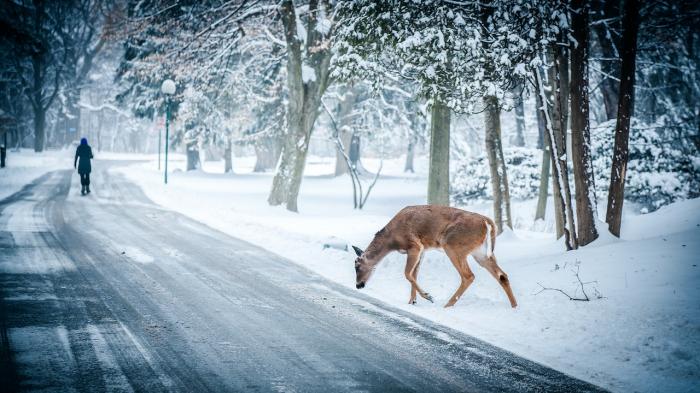
Photo by Snapwire
If you want to help deer survive winter:
You can do this by creating and maintaining good quality deer habitat and improving food resources that will actually benefit all wildlife.
- plant mast producing trees and shrubs, and protect those plantings until they are large enough to survive deer browsing;
- plant evergreen trees for winter thermal cover
- cut sections of mature forests to create forest openings and increase the amount of woody browse available to deer. Read Cutting Browse for Deer.
If you can't resist feeding deer, follow these guidelines:
- To promote better dispersal of animals feed in several sites;
- To avoid human/wildlife conflicts feed well away from any roads or peoples houses;
- If you begin feeding in fall, continue until snow melt in spring, as deer can become dependent on you. Prepare to give more feed as more deer will discover and frequent your sites;
- Spread the food really well, so numerous deer can have simultaneous access to it without fighting. Stronger bucks will often hoard the best spots for themselves and kick approaching competition. So instead of dumping all in one spot make thin, long lines of food, they can go parallel, as long as there's enough room between them for animals to stand. The wider you can make the area the better.
What is The Best Food to Feed Deer?
Disclosure: This website is a participant in the Аmаzon Serviсes LLС Associates Program. Some of the below links are 'аffіlіаte links', meaning, at no additional cost to you, we may earn a commission if you make a purchase.
- tree branches (oak, aspen, crab-apple)
- formulated deer food mixes (deer pellets), such as (Purina Antler Advantage, MONSTERMEAL)
- coarsely milled oats
- carrots
- berries
You can search through this following list of foods to see if deer might enjoy it [to be continued]:
Do deer eat berries?
🦌: "Oh deer god, please send us some!"

Berries of all kinds are deers favorite food. Strawberries, blueberries, blackberries, grapes , watermelon - all are highly appreciated by these gourmets. Berries are packed with minerals and vitamins, acids and sugar and so are perfectly fitted as deer feed. Not that you'd want to share a lot with them, would you? Still, it appears that berries are deer's favorite treat. Absent that, deers' sweet tooth is leading them to fruits. Pears, peaches, apples, bananas.
Do deer eat cheese?
🧀🧀🧀
Some 🦌 apparently do, but should they - that's another question.
Even 1 or 2 year old deer have been spotted sneaking in and drinking milk from the utter of a doe who's feeding her fawn. These are grown animals who have long been weaned. Clearly, they must be perfectly capable to still digest it.
Cow's milk is somewhat similar but goat's milk is more so. With cheese, deer might additionally be attracted to salt content inside.
Still, Junkie spat it out: "No thanks, I'm on a diet".
Can deer eat chicken feed?
🦌: "What's in it?"

Deer are herbivores, best accustomed to eating plant based food, while chiken are omnivores, capable of eating both plant and animal products. What is your chicken feed made of? Read the label and if it's not all vegan, it's likely not a good idea to feed deer that. They might eat it, but will it agree with their digestive system - no one can tell...
Can deer eat corn?
Deer: "Would sell our souls for it!"

Deer love maize, but it presents danger when consumed in big quantities by animals not accustomed to it.
Do deer eat dill?
Deer: "Yuck!"
This is one of the few things deer tend to avoid.
Will deer eat dog food?
🦌: "You gotta be kidding me!"

Seriously, dogs are omnivores (evolved from carnivores), even the cheapest dog food contains (hopefully, for dogs sake) some meat. You shouldn't try and feed herbivores meat products.
Do deer appreciate garlic?
Deer: "We're not fans!"
This is one of the few things deer tend to avoid. But our deer have on a rare occasion been spotted eating toasts with some garlic rubbed into them. So it's not a deer repellent, in case you were wondering. Might protect you against vampires, but not your garden from deer.
Will deer gobble up melons?
🦌: "Just put them down and step away!"
You'll make them very happy if you share your melon, even scraps with deer.
How do deer feel about nuts?
Deer: "We go nuts over them!"
Deer will gorge on a variety of nuts, such as walnuts, pecans, cashews, almonds and peanuts. Raw or fried, salted or unsalted. These mighty nutcrackers have been spotted destroying shelled walnuts that have fallen from the tree.
Do deer touch onion?
🦌: "Hell, no!"
However, a few days later the onion tends to disappear. So they might nibble at it once it's wilted, when they've got nothing better to peck at.
Can deer eat parsley?
Deer: "Any day!"
Ok to feed deer pears?
🦌: "Sure!"
Adore these fruits, will consume whole.
Do deer attack plum trees?
Yep. It's like being in the Garden of Eden for them.
They don't even spit out the bones.

Will deer eat potato?
Deer: "We'll have large fries and soda, please!"
In truth, these animals will likely eat potato. It does not appear to be their favorite, but eventually it gets cleaned up.
Last modified 15 February 2024 at 15:06
Published 02 October 2021

Wondeerful Farm
Appreciate the feedback! Have a good weekend!
Susan 18-10-2024:
I appreciate all the information you have provided. I have a young deer who is basically living in my back yard. Should I provide a water bow/bucket. It is a fenced in backyard but the double wide gate is always open. I haven't seen it leave the backyard since I saw it a couple weeks ago. But, my 7 year old grandson did see a deer in front yard yesterday and he said it was the deer from backyard.

Wondeerful Farm
Hi Susan, Regarding whether deer will drink if you put water out in the bucket for it, after a while quite possibly. Deer have a feer of new objects but after a while grow accustomed to them.
But proximity to wild deer can be dangerous, especially bucks but even females can throw punches with their sharp hooves. If the deer happens to be infected with CWD it is even more dangerous https://e360.yale.edu/features/chronic-wasting-disease-deer
So it's a wild animal and it knows where to find water (unless there's bad draught). I wouldn't try making it feel too welcome, just observe from safe distance.
Add your comment
More «Do deer eat» stories
Do deer eat avocados?
See photo evidence. Deer and avocados - a good mix? Can you feed deer avocado bones or skin? Will avocado tree be safe from deer?
read more...
Do Deer Eat Apples? Deer Farmers Advice.
What if you feed deer some apples? Would they like them? Are apples good for deer? Find out and see photo and video demonstration right here!
read more...
Do Deer Eat Oatmeal?
Can you feed uncooked oats or oatmeal to deer? Watch our videos to find out and read advice on how to feed deer oat meal.
read more...
 '
'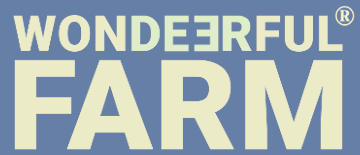
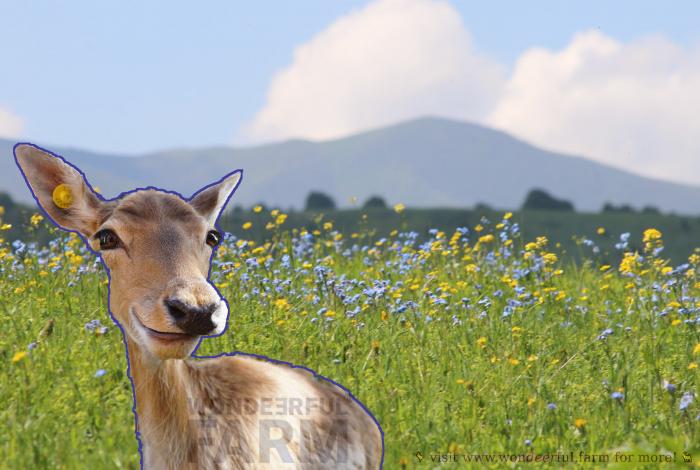



Twinky21 02-12-2023:
Thank you for this important information about deer. I love deer and want to help them, not harm them.